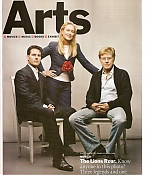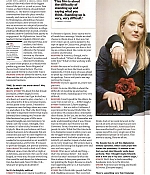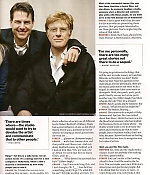|
Simply Streep is your premiere source on Meryl Streep's work on film, television and in the theatre - a career that has won her the praise to be one of the world's greatest working actresses. Created in 1999, we have built an extensive collection to discover Miss Streep's body of work through articles, photos and videos. Enjoy your stay.
|
Celebrating
25 years
of SimplyStreep
|
|
The Lions Roar
Time Magazine ·
November 02, 2007
· Written by Richard Corliss
|
Lions For Lambs is a small, bold, very political film with three of the biggest stars of the past 20, 30 and 40 years: Tom Cruise, 45; Meryl Streep, 58; and Robert Redford, 70. The movie comprises three conversations that take place simultaneously and, more or less, in real time. In Washington, a Republican Senator (Cruise) reveals a new wrinkle in the war on terrorism to a skeptical journalist (Streep). In Southern California, a college professor (Redford) tries to prod a restless student (Andrew Garfield) from apathy to engagement. In Afghanistan, two of the teacher’s former students (Derek Luke and Michael Peña), now soldiers, find themselves in the military offensive the Senator outlined. The film, written by Matthew Michael Carnahan and directed by Redford, is Cruise’s first project as co-head (with producing partner Paula Wagner) of the revived United Artists. The two stars joined Streep to chat with TIME’s Richard Corliss about the movie, stardom and the role of politics in the entertainment business.
TIME: So what’s the movie about? Why did you make it?
MERYL STREEP It’s about this hot female journalist. [Others laugh.] It is too.
ROBERT REDFORD And I got kicked out of school, so I want to play a teacher … I was attracted to it for a personal reason. At this point in my career, I wanted to express my own feelings about my country and where it is. That’s the first thing. The other is that there weren’t that many [serious] films coming out, because the film business has gone a little more toward straight-out entertainment. So when I saw the script, I thought, This is smart. It’s also tricky, because it’s a triptych. How do you balance out three stories that seem to be disparate but are connected and have to come together in a vortex at the end? All points of view needed to be represented so we wouldn’t be categorized as a lefty film. It’s meant to provoke thought, not provide answers.
TOM CRUISE We tried to look at all these different views, from the left or right or in between, and see how they can be challenged, in every way. Because everything that could be said about this Administration has been said. Now it’s like, O.K., what are we going to do about it?
So it’s forthrightly political.
STREEP I think every movie is political. It’s political in what it doesn’t say, what it chooses to ignore. Every movie we’ve all made has a message. Maybe we don’t choose to think about it that way, but every time I go on a press junket to Europe or Japan or China even, people ask questions that presume you have a feeling as a citizen about the events in your country and beyond.
REDFORD In America, though, we’re usually asked, “What’s it like working with Tom? What’s it like working with Meryl?”
STREEP Because we’re afraid to speak. Even though we have the freest society, supposedly, I think many of us are afraid to speak up. And we vilify the people that do speak up. You’re told you’re not supporting the troops.
REDFORD If you’re against us, you’re not patriotic.
STREEP So to me this film is about the difficulty of standing up and saying what you think. Standing up is very, very difficult.
REDFORD I won’t speak for the others, because Tom is not yet 30 … [Others laugh.]
STREEP Neither am I. [More laughing.]
REDFORD … but as a kid in California, I experienced the Second World War. My uncle died. My cousins died. I remember their deaths. In the ’50s, the Joe McCarthy hearings were on TV, and I remember not quite understanding what it was. Nixon was my Senator. Earl Warren was the Governor. To me, they were just boring people in suits. What the film tries to do is to dramatize issues to allow you to see the struggle within these people on an emotional level. And what you see is potentially yet another repeat of what went on in every single war. We seem to have a penchant for letting this happen over and over and over again.
CRUISE Wars never solved anything-that’s my personal belief-but I don’t think that that’s necessarily what the film is about. It does pose questions. It’s not pointing the finger. Because so much was happening after 9/11, it was hard to get to the truth.
STREEP But I think older people had this dull, thudding pressure. They were feeling, Hmm, maybe this is not what we think. And yet we went forward, in the face of all sorts of warnings that are now proven to be the truth. Americans have been anesthetized by good fortune. I recognize myself in every single one of the compromised people in this piece. This movie is saying, Here we all are.
The Senator has to sell the Afghanistan military operation, which could propel him toward the presidency. It seemed to me that you had John Edwards’ smile down perfectly. Then I thought maybe Edwards took it from you in Top Gun. [Others laugh.]
STREEP Well, they’re both incredibly handsome men. So is the director.
CRUISE And they have strong and beautiful wives. [Everyone laughs.]
There’s something very Tom Cruiseian about this character: “Let’s do something!” Yet this is a talk movie, not an action movie. It’s a daring start for a new company in Hollywood, where a film’s success is determined by how many people pay to see it.
CRUISE No, I think the success is in making this picture-in its quality. It’s a gift to start the studio out with Robert Redford, Meryl Streep and this picture that’s reflective of society on all different levels. Robert Redford’s Ordinary People had a great influence on me, as did Meryl Streep. There was a moment on the set where I’m looking at Meryl across from me with her …
STREEP … glasses on. [Everyone laughs.]
CRUISE … with that famous skin and that profile and those eyes. And suddenly Redford comes up behind, and I look at him like, “Oh, my God, Out of Africa! I’ve seen that film so many times, and I go …
STREEP … “Why doesn’t he just wash her hair?” [Others laugh.]
CRUISE … And I was watching this, and I just thought, Oh, f___! And he’d say something, [and] I’d go, Uh, what did he say? I felt like an idiot at times. I’ve wanted to be in a Robert Redford picture. I’ve wanted to work with Meryl Streep. Everyone does. And I’m just grateful to have had this opportunity.
Most of the successful movies this year have been franchise or horror films, not star-driven. As someone heading a studio, someone who’s a director and someone who works with these people, do you think we’re in the first nonstar era of Hollywood?
CRUISE I don’t agree with that, because it’s the stars who are promoting those pictures, that get people interested to see those pictures. You’re neglecting the value of that talent.
REDFORD I think there have always been stars. The fact is Hollywood is a business. It’s going to get attracted to things that will be sure to make money, as franchise films do, so therefore you don’t blame them for that. Now the question is the individuals. For me personally, there are too many great stories out there to do a sequel. So therefore I don’t ever want to do sequels. Well, they push, push, push, push. Finally you say no. Let me put it another way: No. [Others laugh.] And then what do they do? They do a prequel.
CRUISE Butch Cassidy and the Sundance Kid – you go, “What would that sequel be?”












